| Listing 1 - 10 of 31 | << page >> |
Sort by
|
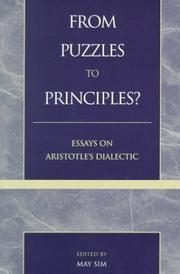
ISBN: 0739100297 0739100289 Year: 1999 Publisher: Lanham, MD : Lexington Books,
Abstract | Keywords | Export | Availability | Bookmark
 Loading...
Loading...Choose an application
- Reference Manager
- EndNote
- RefWorks (Direct export to RefWorks)
Dialectic. --- Dialectique --- Aristotle.
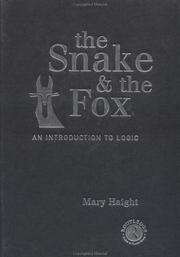
ISBN: 0415166942 9780203061350 0203061357 9781136823596 113682359X 9781136823732 1136823735 9781136823664 1136823662 9780415166935 0415166934 9780415166942 Year: 1999 Publisher: London Routledge
Abstract | Keywords | Export | Availability | Bookmark
 Loading...
Loading...Choose an application
- Reference Manager
- EndNote
- RefWorks (Direct export to RefWorks)
Logic --- Argumentation --- Deduction (Logic) --- Deductive logic --- Dialectic (Logic) --- Logic, Deductive --- Intellect --- Philosophy --- Psychology --- Science --- Reasoning --- Thought and thinking --- Methodology --- Logic.

ISBN: 0415166969 Year: 1999 Publisher: London Routledge
Abstract | Keywords | Export | Availability | Bookmark
 Loading...
Loading...Choose an application
- Reference Manager
- EndNote
- RefWorks (Direct export to RefWorks)
Logic. --- Logic --- Argumentation --- Deduction (Logic) --- Deductive logic --- Dialectic (Logic) --- Logic, Deductive --- Intellect --- Philosophy --- Psychology --- Science --- Reasoning --- Thought and thinking --- Methodology
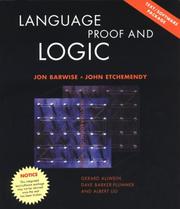
ISBN: 1889119083 Year: 1999 Publisher: New York (N.Y.) Seven bridges
Abstract | Keywords | Export | Availability | Bookmark
 Loading...
Loading...Choose an application
- Reference Manager
- EndNote
- RefWorks (Direct export to RefWorks)
Logic. --- Logic --- Argumentation --- Deduction (Logic) --- Deductive logic --- Dialectic (Logic) --- Logic, Deductive --- Intellect --- Philosophy --- Psychology --- Science --- Reasoning --- Thought and thinking --- Methodology
Book
ISBN: 3825309274 Year: 1999 Volume: 269 Publisher: Heidelberg : C. Winter,
Abstract | Keywords | Export | Availability | Bookmark
 Loading...
Loading...Choose an application
- Reference Manager
- EndNote
- RefWorks (Direct export to RefWorks)
Enlightenment --- Philosophy in literature --- Dialectic in literature --- Narration (Rhetoric) --- Siècle des Lumières --- Philosophie dans la littérature --- Dialectique dans la littérature --- Narration --- Sterne, Laurence,
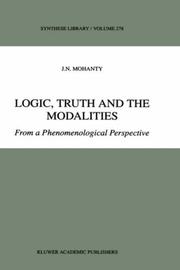
ISBN: 0792355504 9048151635 9401721130 9780792355502 Year: 1999 Volume: 278 Publisher: Dordrecht: Kluwer Academic Publishers,
Abstract | Keywords | Export | Availability | Bookmark
 Loading...
Loading...Choose an application
- Reference Manager
- EndNote
- RefWorks (Direct export to RefWorks)
This volume is a collection of my essays on philosophy of logic from a phenomenological perspective. They deal with the four kinds of logic I have been concerned with: formal logic, transcendental logic, speculative logic and hermeneutic logic. Of these, only one, the essay on Hegel, touches upon 'speculative logic', and two, those on Heidegger and Konig, are concerned with hermeneutic logic. The rest have to do with Husser! and Kant. I have not tried to show that the four logics are compatible. I believe, they are--once they are given a phenomenological underpinning. The original plan of writing an Introduction in which the issues would have to be formulated, developed and brought together, was abandoned in favor of writing an Introductory Essay on the 'origin'- in the phenomenological sense -of logic. J.N.M. Philadelphia INTRODUCTION: THE ORIGIN OF LOGIC The question of the origin of logic may pertain to historical origin (When did it all begin? Who founded the science of logic?), psychological origin (When, in the course of its mental development, does the child learn logical operations?), cultural origin (What cultural - theological, metaphysical and linguisti- conditions make such a discipline as logic possible?), or transcendental constitutive origin (What sorts of acts and/or practices make logic possible?).
Logic. --- Phenomenology. --- Phenomenology --- Philosophy, Modern --- Logic --- Argumentation --- Deduction (Logic) --- Deductive logic --- Dialectic (Logic) --- Logic, Deductive --- Intellect --- Philosophy --- Psychology --- Science --- Reasoning --- Thought and thinking --- Methodology --- Phenomenology . --- Epistemology. --- Epistemology --- Theory of knowledge --- Genetic epistemology. --- Developmental psychology --- Knowledge, Theory of
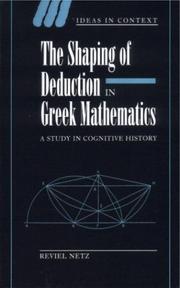
ISBN: 0521622794 9780521622790 9780511543296 9780521541206 Year: 1999 Volume: 51 Publisher: Cambridge Cambridge University Press
Abstract | Keywords | Export | Availability | Bookmark
 Loading...
Loading...Choose an application
- Reference Manager
- EndNote
- RefWorks (Direct export to RefWorks)
Logic. --- Mathematics, Greek. --- Logic --- Mathematics, Greek --- Argumentation --- Deduction (Logic) --- Deductive logic --- Dialectic (Logic) --- Logic, Deductive --- Intellect --- Philosophy --- Psychology --- Science --- Reasoning --- Thought and thinking --- Greek mathematics --- Geometry --- Methodology --- Mathematical logic --- Mathématiques grecques --- Logique
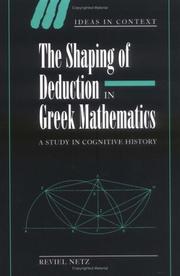
ISBN: 1107114950 0511324553 0511172001 9786610418879 1280418877 0511543298 0521541204 0511149808 0511050534 051101743X 9780511017438 0511035292 9780511035296 9780511149801 9780511050534 0521622794 9780521622790 9780511543296 9780521541206 Year: 1999 Publisher: Cambridge ; New York : Cambridge University Press,
Abstract | Keywords | Export | Availability | Bookmark
 Loading...
Loading...Choose an application
- Reference Manager
- EndNote
- RefWorks (Direct export to RefWorks)
The aim of this book is to explain the shape of Greek mathematical thinking. It can be read on three levels: as a description of the practices of Greek mathematics; as a theory of the emergence of the deductive method; and as a case-study for a general view on the history of science. The starting point for the enquiry is geometry and the lettered diagram. Reviel Netz exploits the mathematicians' practices in the construction and lettering of their diagrams, and the continuing interaction between text and diagram in their proofs, to illuminate the underlying cognitive processes. A close examination of the mathematical use of language follows, especially mathematicians' use of repeated formulae. Two crucial chapters set out to show how mathematical proofs are structured and explain why Greek mathematical practice manages to be so satisfactory. A final chapter looks into the broader historical setting of Greek mathematical practice.
Mathematics, Greek. --- Logic. --- Argumentation --- Deduction (Logic) --- Deductive logic --- Dialectic (Logic) --- Logic, Deductive --- Intellect --- Philosophy --- Psychology --- Science --- Reasoning --- Thought and thinking --- Greek mathematics --- Geometry --- Methodology --- Mathematical Sciences --- General and Others
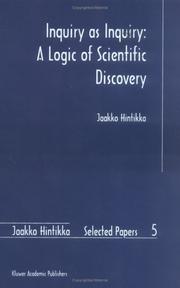
ISBN: 079235477X 9048151392 9401593132 9780792354772 Year: 1999 Volume: 5 Publisher: Dordrecht: Kluwer Academic Publishers,
Abstract | Keywords | Export | Availability | Bookmark
 Loading...
Loading...Choose an application
- Reference Manager
- EndNote
- RefWorks (Direct export to RefWorks)
Is a genuine logic of scientific discovery possible? In the essays collected here, Hintikka not only defends an affirmative answer; he also outlines such a logic. It is the logic of questions and answers. Thus inquiry in the sense of knowledge-seeking becomes inquiry in the sense of interrogation. Using this new logic, Hintikka establishes a result that will undoubtedly be considered the fundamental theorem of all epistemology, viz., the virtual identity of optimal strategies of pure discovery with optimal deductive strategies. Questions to Nature, of course, must include observations and experiments. Hintikka shows, in fact, how the logic of experimental inquiry can be understood from the interrogative vantage point. Other important topics examined include induction (in a forgotten sense that has nevertheless played a role in science), explanation, the incommensurability of theories, theory-ladenness of observations, and identifiability.
Philosophy of science --- Discoveries in science --- Logic --- Discoveries in science. --- Logic. --- Philosophy and science. --- History. --- Epistemology. --- Philosophy of Science. --- History, general. --- Epistemology --- Theory of knowledge --- Philosophy --- Psychology --- Argumentation --- Deduction (Logic) --- Deductive logic --- Dialectic (Logic) --- Logic, Deductive --- Intellect --- Science --- Reasoning --- Thought and thinking --- Annals --- Auxiliary sciences of history --- Science and philosophy --- Methodology --- Breakthroughs, Scientific --- Discoveries, Scientific --- Scientific breakthroughs --- Scientific discoveries --- Creative ability in science --- Research
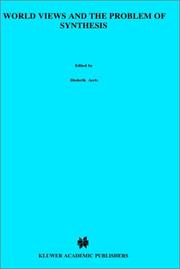
ISBN: 9054872292 9789054872290 9780792357605 0792357604 9401059810 9401147086 Year: 1999 Volume: 4 Publisher: Brussel Dordrecht VUB Univrsity Press Kluwer Academic Publishers
Abstract | Keywords | Export | Availability | Bookmark
 Loading...
Loading...Choose an application
- Reference Manager
- EndNote
- RefWorks (Direct export to RefWorks)
This book considers philosophy to be more than mere reflection. Through philosophy, humankind can give meaning to the world. In part, this book re-evaluates the philosophy of Leo Apostel, who dedicated his life to the investigation of the use of philosophy in everyday life. But it is also a presentation of international research carried out along the lines of the worldviews project. The contributions address not only professional philosophers, but also students, teachers, academics and everyone interested in the relationship between philosophy and the world.
Philosophy --- Apostel, Leo --- Epistémologie --- Kennisleer --- Life --- Magritte --- Einstein --- Philosophy. --- Science. --- Humanity --- Ethics --- Natural science --- Natural sciences --- Science of science --- Sciences --- Mental philosophy --- Humanities --- Monograph --- Religion—Philosophy. --- Philosophy and science. --- Logic. --- Metaphysics. --- Philosophy of Religion. --- Philosophy of Science. --- God --- Ontology --- Philosophy of mind --- Argumentation --- Deduction (Logic) --- Deductive logic --- Dialectic (Logic) --- Logic, Deductive --- Intellect --- Psychology --- Science --- Reasoning --- Thought and thinking --- Science and philosophy --- Methodology --- Apostel, L.
| Listing 1 - 10 of 31 | << page >> |
Sort by
|

 Search
Search Feedback
Feedback About UniCat
About UniCat  Help
Help News
News